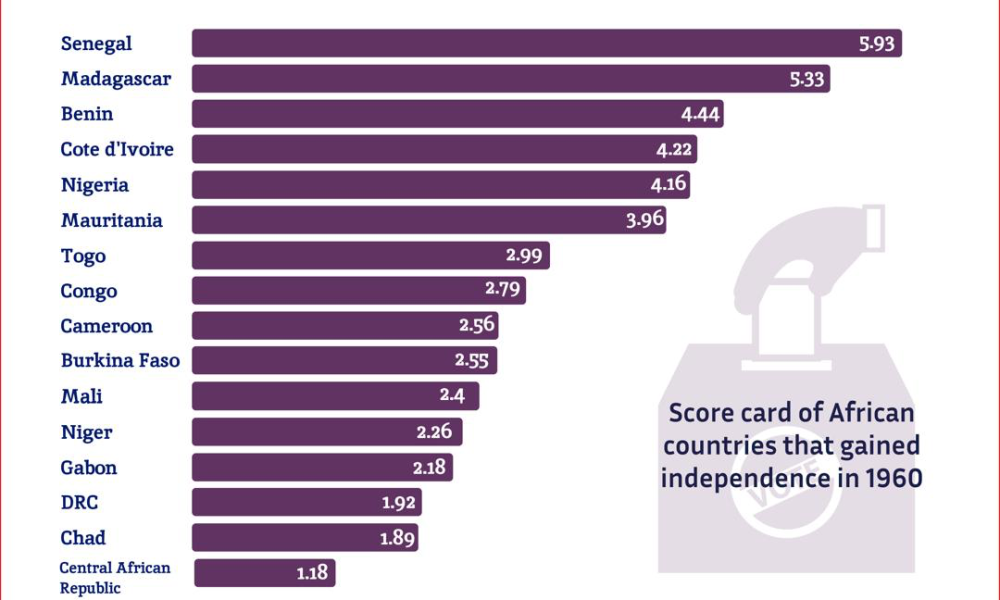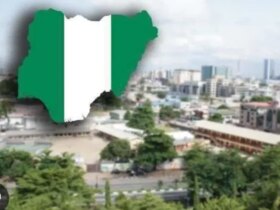RipplesMetrics: Nigeria at 65: Democracy improves, but still trails behind global standards

As Nigeria marks its 65th Independence anniversary today, new data shows that while the country’s democracy has made marginal improvements over the years, it still lags behind both the global average and several of its African peers.
A review of democracy scores between 2006 and 2023, compiled by the Economist Intelligence Unit, highlights a persistent gap. Nigeria’s score rose from 3.5 in 2006 to 4.2 in 2023, reflecting incremental growth, yet it remains below the global average of 5.2. The 2024 update places Nigeria at 4.16, confirming its status as a hybrid regime, a system that combines elements of democracy with authoritarian practices, including weak institutions, electoral irregularities, and restricted freedoms.
Nigeria’s Standing Among Its Peers
The data also compares Nigeria with other countries that gained independence around 1960. In this group, Nigeria ranked third in 2024, behind Senegal (5.93) and Madagascar (5.33), but ahead of Côte d’Ivoire (4.22) and Benin (4.44). The average democracy score for the 1960 peers stands at 3.17, well below Nigeria’s 4.16.
At the bottom of the scale, countries such as Chad (1.89), the Democratic Republic of Congo (1.92), and the Central African Republic (1.18) remain entrenched in authoritarian rule. Nigeria, though not a leading light, stands as a relative outlier for maintaining democratic continuity in a region where authoritarianism has resurged.
Democracy’s Uneven Journey Since 1960
Nigeria’s democracy has travelled a turbulent path since independence.
1960–1966:
The First Republic, based on a Westminster-style parliamentary system, collapsed under the weight of ethnic rivalries and military intervention.
READ ALSO: EFCC arraigns FBI suspect for alleged cryptocurrency account takeover
1966–1979:
Military governments dominated, including the civil war era (1967–1970), leaving democratic governance suspended.
1979–1983:
The Second Republic under President Shehu Shagari attempted a U.S.-style presidential system, but corruption and electoral malpractice ended in another coup.
1983–1999:
Nearly two decades of military rule ensued, interrupted briefly by aborted civilian transitions. The annulment of the June 12, 1993 election, won by Moshood Abiola, remains a turning point in Nigeria’s democratic struggle.
1999–present: With the return to civilian rule under President Olusegun Obasanjo, Nigeria entered its Fourth Republic, which has now lasted 25 years, its longest democratic stretch. Yet, democracy remains fragile, often undermined by electoral disputes, insecurity, and governance challenges.
A Democracy at the Crossroads
The charts show slow progress but also persistent underperformance. Even as Nigeria’s democracy score improved from the low 3s in the mid-2000s to the low 4s today, it has not crossed the 5-point mark, prompting critics to classify it as a flawed democracy when assessed over time.
This has raised concerns about the depth of Nigeria’s democratic development. The 2023 elections, marred by logistical failures and contested outcomes, reinforced skepticism about electoral credibility. Civic space also faces pressure, with journalists, activists, and opposition voices still vulnerable to state clampdowns. For Nigeria, bridging the gap requires urgent reforms: strengthening electoral bodies, deepening the rule of law, ensuring judicial independence, and guaranteeing citizens’ rights.
By: James Odunayo
The post RipplesMetrics: Nigeria at 65: Democracy improves, but still trails behind global standards appeared first on Latest Nigeria News | Top Stories from Ripples Nigeria.







